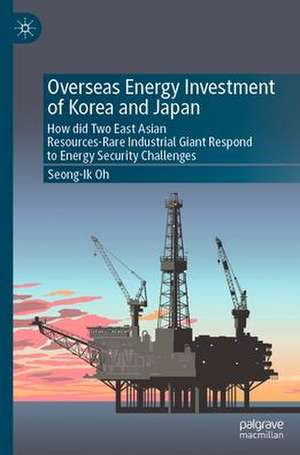Overseas Energy Investment of Korea and Japan: How did Two East Asian Resources-Rare Industrial Giants Respond to Energy Security Challenges
Autor Seong-ik Ohen Limba Engleză Hardback – 7 apr 2023
The book provides an in-depth study highlighting the differences in political systems which led to contrasting outcomes. The one with a small number of veto players succeeded in establishing and expanding state-owned oilcompanies while producing policy inconsistency at the same time and vice versa. This comprehensive review of East Asian politics will add value to East Asian Studies by presenting a new approach through a universal theory rather than cultural uniqueness. As a readable case study on energy security, this book will be an essential reference for scholars, policymakers, industry insiders and citizens who are interested in how nations respond to historic challenges in a political and international context.
| Toate formatele și edițiile | Preț | Express |
|---|---|---|
| Paperback (1) | 798.49 lei 38-44 zile | |
| Springer Nature Singapore – 8 apr 2024 | 798.49 lei 38-44 zile | |
| Hardback (1) | 897.84 lei 43-57 zile | |
| Springer Nature Singapore – 7 apr 2023 | 897.84 lei 43-57 zile |
Preț: 897.84 lei
Preț vechi: 1094.93 lei
-18% Nou
Puncte Express: 1347
Preț estimativ în valută:
171.86€ • 186.74$ • 144.45£
171.86€ • 186.74$ • 144.45£
Carte tipărită la comandă
Livrare economică 21 aprilie-05 mai
Preluare comenzi: 021 569.72.76
Specificații
ISBN-13: 9789819902842
ISBN-10: 9819902843
Pagini: 291
Ilustrații: XXIV, 291 p. 14 illus., 13 illus. in color.
Dimensiuni: 155 x 235 mm
Greutate: 0.64 kg
Ediția:2023
Editura: Springer Nature Singapore
Colecția Palgrave Macmillan
Locul publicării:Singapore, Singapore
ISBN-10: 9819902843
Pagini: 291
Ilustrații: XXIV, 291 p. 14 illus., 13 illus. in color.
Dimensiuni: 155 x 235 mm
Greutate: 0.64 kg
Ediția:2023
Editura: Springer Nature Singapore
Colecția Palgrave Macmillan
Locul publicării:Singapore, Singapore
Cuprins
Chapter 1: Introduction.- Chapter 2: The Establishment of the JPDC in the 1960s.- Chapter 3: The Establishment of PEDCO in the 1970s.- Chapter 4: The Attempt to Establish a Japanese State-Owned Oil Company in the early 21st century.- Chapter 5. A Business-Friendly President and the Strengthening of Korea’s State-owned Oil Company.- Chapter 6: Conclusion.- Chapter 7: Epilogue.
Notă biografică
Seong Ik Oh received master’s degrees from Harvard Kennedy School and Fletcher School, Tufts University, respectively. Also, he earned a Ph.D. from Johns Hopkins University’s School of Advanced International Studies (SAIS). Continuing much of his career in public service, from the Korean Ministry of Maritime Affairs and Fisheries, the Ministry of Land, Infrastructure and Transport, to the Presidential Committee on Regional Development, he is currently a director general at the Ministry of Land, Infrastructure and Transport . He also teaches as adjunct professor at the Graduate School of Public Administration, Yonsei University.
Textul de pe ultima copertă
Under the contraction of global energy supply brought on by geopolitical situation, this timely book addresses how resource-scarce developing countries respond to challenges in energy security. In particular, for countries underpinning efforts for an autonomous supply of energy, either oil/natural gas, nuclear power or renewable energy, this book revisits the evolution of overseas energy investment of two industrial giants in East Asia, Korea and Japan. It will provide meaningful lessons of how the state sets up policies and navigates political procedures for energy security. While a historical case study, it also offers its readers new insight into the international energy market by taking the stark déjà vu in its repetitive nature and putting it into context.
The book provides an in-depth study highlighting the differences in political systems which led to contrasting outcomes. The one with a small number of veto players succeeded in establishing and expanding state-owned oilcompanies while producing policy inconsistency at the same time and vice versa. This comprehensive review of East Asian politics will add value to East Asian Studies by presenting a new approach through a universal theory rather than cultural uniqueness. As a readable case study on energy security, this book will be an essential reference for scholars, policymakers, industry insiders and citizens who are interested in how nations respond to historic challenges in a political and international context.
Seong Ik Oh received master’s degrees from Harvard Kennedy School and Fletcher School, Tufts University, respectively. Also, he earned a Ph.D. from Johns Hopkins University’s School of Advanced International Studies (SAIS). Continuing much of his career in public service, from the Korean Ministry of Maritime Affairs and Fisheries, the Ministry of Land, Infrastructure and Transport, to the Presidential Committee on Regional Development, he is currently a director at the Ministry of Land, Infrastructure and Transport. He also teaches as adjunct professor at the Graduate School of Public Administration, Yonsei University.
The book provides an in-depth study highlighting the differences in political systems which led to contrasting outcomes. The one with a small number of veto players succeeded in establishing and expanding state-owned oilcompanies while producing policy inconsistency at the same time and vice versa. This comprehensive review of East Asian politics will add value to East Asian Studies by presenting a new approach through a universal theory rather than cultural uniqueness. As a readable case study on energy security, this book will be an essential reference for scholars, policymakers, industry insiders and citizens who are interested in how nations respond to historic challenges in a political and international context.
Seong Ik Oh received master’s degrees from Harvard Kennedy School and Fletcher School, Tufts University, respectively. Also, he earned a Ph.D. from Johns Hopkins University’s School of Advanced International Studies (SAIS). Continuing much of his career in public service, from the Korean Ministry of Maritime Affairs and Fisheries, the Ministry of Land, Infrastructure and Transport, to the Presidential Committee on Regional Development, he is currently a director at the Ministry of Land, Infrastructure and Transport. He also teaches as adjunct professor at the Graduate School of Public Administration, Yonsei University.
Caracteristici
Explores how resource scarcity fueled creativity Explains energy economics in East Asia Provides context for decarbonization efforts
